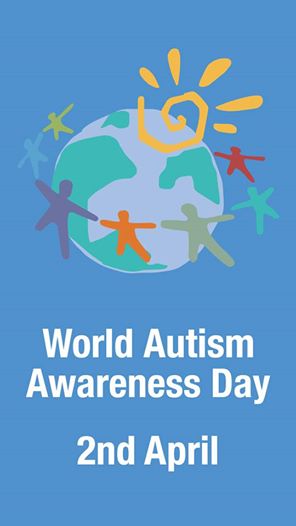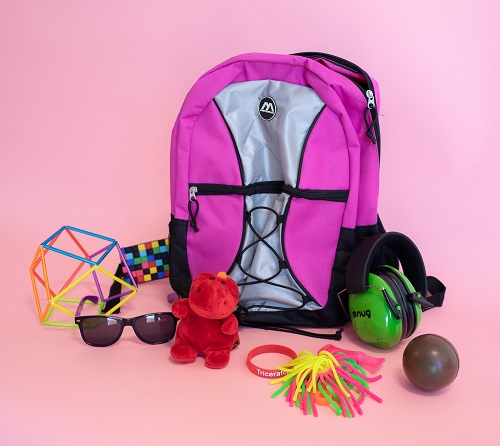April 2 is World Autism Awareness Day, and HMNS is proud to have raised awareness about autism amongst staff within the past year! HMNS recertified as a Certified Autism Center in 2021, and HMNS at Sugar Land and The George Observatory received the same distinction for the first time. What this means is that staff went through a training module that taught them what autism is and how to serve guests with autism more confidently.

It was wonderful to see that many of our staff members have connections to people with autism and sensory sensitivities and knew a lot about what living with autism is like! It was also great to see that staff members who were not aware of what autism is grew in their knowledge and abilities. We want to highlight some things that our staff members learned through their own words, as well as share some resources with you to extend awareness beyond our building!
One staff member shared, “I really benefited from the video that simulated what the experience of walking through a mall is like for an autistic child versus what bystanders would see as the child is melting down. I also learned more about preferences for identity-first versus person-first language.”
This staff member is highlighting a specific video that was viewing during the training which shows the perspective of someone with autism having a difficult time with sensory stimuli in a public place. The video also highlights a family member’s reactions versus the bystander’s reactions. If you want to check out the video too, you can view it here:
Another important topic this staff member brings up is verbiage. Identity-first language means that a person prefers to be called “an autistic person”. They consider autism to be an inherent part of their identity and prefer to have “autism” listed before “person”. Person-first language means that a person prefers to be called “a person with autism”. They prefer to be identified as a person first, before listing “autism” as an identifier. HMNS strives to use person-first language in all that we do, but we realize that there are varying preferences amongst the autism community. It’s always right and respectful to defer to what the person you’re interacting with prefers!
Another staff member shared:
“It’s important to provide a world-class experience to everybody, and understanding how to do that with those who may think/interpret outside stimuli differently than the person next to them is the key to making sure both individuals enjoy their time here.”
This employee is pointing out the fact that all people experience stimuli differently. Autism is a spectrum, so people with autism may crave sensory input or stray away from it completely… along with every preference in between! Everybody is different. If you’ve visited HMNS, you may know that we have a lot of cool sounds, lights, and moving components to our exhibit halls. This may be really hard for guests with autism and sensory sensitivities to absorb or be around. Our staff members not only learned how to communicate with guests who may feel overwhelmed at the Museum, but they also learned what resources HMNS has to offer that can help. Our Sensory Backpacks are always available for check-out, and they are a really good tool to use if sensory stimuli are hard for you, a family member, or a friend to process.

While we’re on the topic of gaining confidence in helping guests who may react to stimuli differently, I want to highlight the staff member below who made a real difference for a family visiting one of our Special Exhibits, Ramses the Great and the Gold of the Pharaohs. They shared the following experience:
“Shortly after the training, I was able to assist a child in the new Ramses exhibit. He was fearful of the VR experience but wanted to take part in it, with someone on standby in case he had a negative reaction to it. I let him and his mother know what to expect from the experience, as well as the ways in which I could help, and I took the time to learn their needs and expectations. I think the training helped me to handle the situation with more patience and understanding, while letting the child and his mother take the lead as far as what kind of and how much assistance they needed. The child made it almost all the way through the VR experience, and afterward, I told him what a great job he did. His mother thanked me for taking the time to work with him, and he seemed much more confident by the time they left.”
To wrap up, I want to share some words from an employee about public institutions as a whole…
“As an institution that serves the public, we have an ethical responsibility to provide accessibility to our visitors and to train our staff to be able to provide the assistance necessary to help visitors have a positive experience.”
Doing the work of researching and learning about other people’s experiences, whether that’s through the avenue of a work training or on your own time, is so valuable. It not only gives you the tools to be a better coworker and citizen, it also helps you in creating a culture of compassion around yourself and making meaningful connections with others. With 1 out of 44 children being diagnosed with autism and 1 in 6 people having a sensory need or sensitivity, it’s highly likely you’ll use the communication skills and information you learn on the daily!
P.S. If you’re interested in visiting HMNS, but the stimuli is too much for your or your family member or friend, check out HMNS Sensory Friendly Events for upcoming dates. Our exhibits will be modified to be as sensory-neutral as possible to create a comfortable and welcoming environment for our guests with autism and sensory sensitivities.
*Ramses the Great and the Gold of the Pharaohs is presented by World Heritage Exhibitions and Cityneon, this world premiere exhibition is now open in its limited run at the Houston Museum of Natural Science through May 23, 2022, before embarking on a multi-country, world-wide tour.






